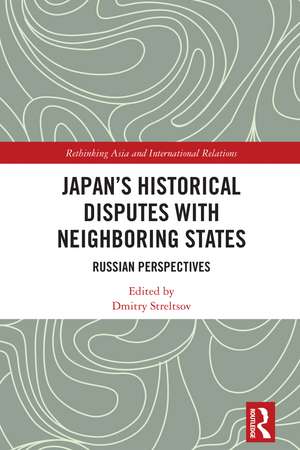Japan's Historical Disputes with Neighboring States: Russian Perspectives: Rethinking Asia and International Relations
Editat de Dmitry Streltsoven Limba Engleză Hardback – 16 sep 2024
Din seria Rethinking Asia and International Relations
- 17%
 Preț: 258.91 lei
Preț: 258.91 lei -
 Preț: 383.71 lei
Preț: 383.71 lei -
 Preț: 476.86 lei
Preț: 476.86 lei - 17%
 Preț: 213.58 lei
Preț: 213.58 lei - 16%
 Preț: 241.15 lei
Preț: 241.15 lei -
 Preț: 469.34 lei
Preț: 469.34 lei -
 Preț: 381.72 lei
Preț: 381.72 lei - 26%
 Preț: 819.48 lei
Preț: 819.48 lei - 31%
 Preț: 764.20 lei
Preț: 764.20 lei -
 Preț: 388.64 lei
Preț: 388.64 lei -
 Preț: 402.94 lei
Preț: 402.94 lei - 17%
 Preț: 222.32 lei
Preț: 222.32 lei -
 Preț: 399.29 lei
Preț: 399.29 lei - 26%
 Preț: 764.36 lei
Preț: 764.36 lei - 18%
 Preț: 1061.06 lei
Preț: 1061.06 lei - 18%
 Preț: 1002.99 lei
Preț: 1002.99 lei - 12%
 Preț: 299.52 lei
Preț: 299.52 lei - 16%
 Preț: 241.15 lei
Preț: 241.15 lei -
 Preț: 390.37 lei
Preț: 390.37 lei - 17%
 Preț: 246.93 lei
Preț: 246.93 lei - 13%
 Preț: 297.99 lei
Preț: 297.99 lei - 26%
 Preț: 762.97 lei
Preț: 762.97 lei - 25%
 Preț: 767.93 lei
Preț: 767.93 lei -
 Preț: 463.58 lei
Preț: 463.58 lei - 26%
 Preț: 762.16 lei
Preț: 762.16 lei -
 Preț: 469.34 lei
Preț: 469.34 lei - 31%
 Preț: 765.45 lei
Preț: 765.45 lei - 26%
 Preț: 764.20 lei
Preț: 764.20 lei - 30%
 Preț: 847.86 lei
Preț: 847.86 lei -
 Preț: 389.66 lei
Preț: 389.66 lei - 25%
 Preț: 767.01 lei
Preț: 767.01 lei - 18%
 Preț: 1004.55 lei
Preț: 1004.55 lei - 18%
 Preț: 1109.18 lei
Preț: 1109.18 lei - 26%
 Preț: 679.92 lei
Preț: 679.92 lei
Preț: 1005.80 lei
Preț vechi: 1226.58 lei
-18% Nou
Puncte Express: 1509
Preț estimativ în valută:
192.46€ • 201.45$ • 160.19£
192.46€ • 201.45$ • 160.19£
Carte tipărită la comandă
Livrare economică 31 martie-14 aprilie
Preluare comenzi: 021 569.72.76
Specificații
ISBN-13: 9781032774800
ISBN-10: 1032774800
Pagini: 246
Dimensiuni: 156 x 234 x 22 mm
Greutate: 0.61 kg
Ediția:1
Editura: Taylor & Francis
Colecția Routledge
Seria Rethinking Asia and International Relations
Locul publicării:Oxford, United Kingdom
ISBN-10: 1032774800
Pagini: 246
Dimensiuni: 156 x 234 x 22 mm
Greutate: 0.61 kg
Ediția:1
Editura: Taylor & Francis
Colecția Routledge
Seria Rethinking Asia and International Relations
Locul publicării:Oxford, United Kingdom
Public țintă
Postgraduate and Undergraduate AdvancedCuprins
Introduction. Unresolved Issues of History in Japan’s Relations With Its Neighbours: Mutual Perceptions and Attitudes Chapter 1. Identity and Historical Memory Chapter 2. Historical Memory in the Foreign Policy Discourse of Contemporary Japan Chapter 3. Issues of the Historical Past on the Agenda of Modern Japan–China Relations Chapter 4. The Japanese Colonial Heritage in Taiwan as a Problem of the Historical Past Chapter 5. Issues of the Historical Past in Current Relations Between Japan and the Countries of the Korean Peninsula Chapter 6. “Apology Diplomacy” in Japan's Relations With East Asian Countries Chapter 7. Mutual Images and Thorny Issues of Historical Past in the Socio-Political Discourse of Russia and Japan Chapter 8. The Japanese Presence on Sakhalin (1905–1945) as an Issue of Historical Memory Chapter 9. Japanese Prisoners of War in the USSR: the Legal, Social and Humanitarian Aspects of “Siberian Captivity”
Notă biografică
Dmitry Streltsov is Head of the Department of Oriental Studies at MGIMO University, and Leading Research Fellow at the Institute of China and Contemporary Asia, Russian Academy of Sciences. Since 2008, he has been heading the Russian Association of Japanologists and is Editor-in-Chief of the Yearbook Japan, Russian Japanology Review, and the e-journal Japanese Studies in Russia. His main research field is the domestic politics and diplomacy of contemporary Japan. He is the author of more than 300 academic works, including eight individual monographs published in Russian, such as Japan as Green Superpower (MGIMO-University Pb, 2012), Foreign Policy Priorities of Japan in the Asia Pacific (Vostochnaya literatura, 2015), and The System of 1955 (Vostochnaya literatura, 2019). He contributed two chapters and was the coeditor of A History of Russo-Japanese Relations: Over Two Centuries of Cooperation and Competition (Brill, 2019). He also contributed one chapter and was the coeditor of Handbook of Japan-Russia Relations (Amsterdam University Press, 2024).
Descriere
This book examines Japan’s relationships with China, Russia, the states of the Korean Peninsula, and Taiwan. Analyzing key points of conflict, their roots, and current relations, it highlights their significance for each country.
